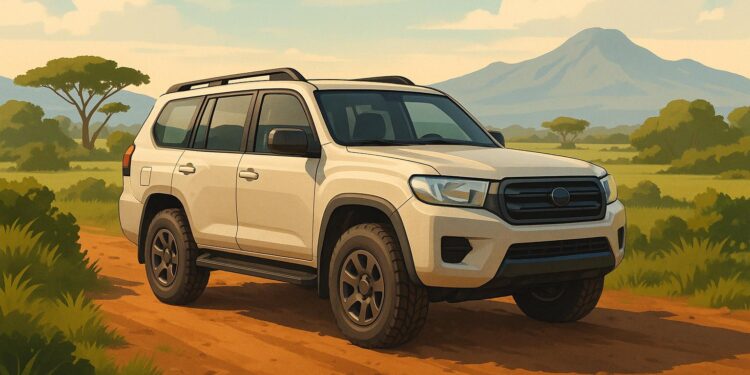Want your car to last longer and handle Tanzania‘s tough roads? Start with these essentials:
- Stick to Regular Maintenance: Change oil every 5,000–7,500 miles, check tire pressure, and inspect fluid levels often.
- Prepare for Rough Roads: Pay attention to suspension, alignment, and shock absorbers.
- Adapt to Weather: Clean your car frequently during dusty dry seasons and ensure wipers and lights are ready for rainy months.
- Use Quality Parts and Trusted Mechanics: Genuine parts and skilled mechanics make a big difference.
- Carry Essentials for Emergencies: A toolkit, spare parts, and fluids can save the day on long trips.
Summary Table of Key Tips:
| Task | Frequency/Action |
|---|---|
| Oil Change | Every 5,000–7,500 miles |
| Tire Pressure | Check regularly, especially before trips |
| Brake Fluid | Replace every 30,000 miles or 2 years |
| Coolant | Replace around 50,000 miles |
| Seasonal Prep | Check wipers, lights (rainy season) |
Pro Tip: Regular inspections and quick fixes prevent costly repairs later. Ready to dive into the details? Keep reading!
13 Car Maintenance Tips MECHANICS Don’t Want YOU to …
Basic Maintenance Steps
Driving in Tanzania’s challenging conditions can take a toll on vehicles. Regular maintenance helps keep your car running smoothly and extends its lifespan.
When to Change Oil
Stick to your vehicle manufacturer’s recommendations – usually every 5,000 to 7,500 miles. If you often drive in stop-and-go traffic, on rough roads, or in dusty areas, consider changing the oil more often.
- Synthetic oil lasts longer and performs better but costs more.
- Conventional oil is cheaper but needs frequent replacement.
Monthly oil check tips:
- Check the oil level when the engine is cool.
- Look for oil that’s dark, dirty, or contains particles.
- Track oil consumption and adjust your maintenance schedule if needed.
Tire Maintenance
Tires are especially important on Tanzania’s varied roads. Proper care improves safety, fuel efficiency, and tire lifespan.
- Check tire pressure regularly, especially before long trips.
- Rotate tires periodically to ensure even wear.
- Inspect treads for uneven wear or damage.
- Make sure the spare tire is in good condition and properly inflated.
Consistent tire care also supports the performance of other vehicle systems, like fluids and brakes.
Checking Car Fluids
Keeping an eye on fluid levels is essential for your car’s performance. Here’s what to check:
- Brake Fluid: Keep it at the recommended level; replace it every 30,000 miles or two years.
- Coolant: Check when the engine is cool; replace around 50,000 miles.
- Transmission Fluid: Check with the engine warm; replace every 30,000–60,000 miles.
- Power Steering Fluid: Monitor and top up as needed.
- Windshield Wiper Fluid: Refill whenever it’s empty.
Always check fluids when the engine is cool, except for transmission fluid, which should be checked warm.
Dealing with Local Conditions
Tailor your car maintenance to handle Tanzania’s dust, changing weather, and rugged roads. These tips build on basic care to address the specific challenges of driving in Tanzania.
Managing Dust and Weather
Unpaved roads in Tanzania generate a lot of dust, which can impact your car’s performance. To keep your vehicle running smoothly, clean it often and stick to your maintenance schedule. Many local service centers offer maintenance packages designed specifically for these conditions.
Seasonal Maintenance Tips
Tanzania’s weather features distinct wet and dry seasons, with rains usually falling from November to April. Before the rainy season, check that your wipers and headlights are in good working order. During the dry season, regular inspections and fluid checks can help your car handle the heat and dust.
Handling Rough Roads
Driving on uneven terrain puts extra stress on your car. Pay close attention to wheel alignment and shock absorbers, as they tend to take the brunt of the strain. Local service centers are well-equipped to help maintain these components and keep your car in good shape for tough roads.
sbb-itb-d9186c2
Finding Good Services and Parts
In Tanzania, maintaining your vehicle in the face of tough driving conditions requires dependable services and authentic parts.
Choosing a Mechanic
Stick with trusted local mechanics who have a solid track record. Look for workshops that can handle a range of services, such as:
- Wheel alignment and balancing
- Engine and gearbox repairs
- Electrical system fixes
- Suspension and steering adjustments
- Brake maintenance
Once you’ve found a reliable mechanic, make sure your source for parts is just as dependable.
Buying Parts and Tools
The quality of your vehicle’s parts plays a big role in how long it lasts. As John Mwakibete puts it:
"Using original and high-quality parts is an investment in your car’s longevity. Manufacturers design these parts with extensive research and development to ensure reliability".
Here are some common types of suppliers to consider:
| Supplier Type | Specialization | Services |
|---|---|---|
| Engine Specialists | Engine parts | Engine rebuilding, cylinder head manufacturing |
| Import Specialists | European car parts | Online ordering, delivery services |
| General Suppliers | Automotive parts | Tires, batteries, brakes, shock absorbers |
Road Trip Tool Kit
Before hitting the road for a long trip, pack a basic toolkit to handle unexpected situations. Include:
- Basic Tools: Wrenches, screwdrivers, pliers
- Emergency Gear: Flashlight, warning triangles, first-aid kit
- Spare Parts: Extra fuses, bulbs, a fan belt
- Fluids: Engine oil, coolant, and brake fluid
Fix Common Problems
It’s important to know which car issues you can handle yourself and which require a mechanic. This guide covers common problems and quick fixes, especially for challenges specific to Tanzania’s driving conditions. Tackling issues promptly, in addition to regular maintenance, helps keep your car dependable.
Problem-Solution Guide
Here’s a handy table for dealing with frequent car troubles in tough driving environments:
| Problem | Common Causes | Quick Fix | Prevention |
|---|---|---|---|
| Engine Overheating | Stuck thermostat, low coolant | Remove a stuck thermostat; check and refill coolant | Regularly check coolant; inspect the cooling system |
| Stalling Engine | Poor fuel quality, clogged filters | Pre-fill new diesel filters and bleed the system | Use trusted fuel stations; keep the tank above half-full |
| Brake Issues | Hydraulic pipe damage | Crimp the damaged brake line and bleed the system | Inspect brakes regularly; drive cautiously on rough roads |
| Battery Problems | Loose connections, corrosion | Test connections with a meter; clean battery terminals | Clean terminals often; secure all connections |
| Clutch Failure | Hydraulic system failure | Start in second gear and coast to shift gears | Check fluid levels regularly; fix minor issues quickly |
While you can handle some of these problems on your own, certain situations call for professional help.
"The golden rule is to inspect your vehicle often and check for things that work loose."
What You Can Do vs. When to Call a Mechanic
Some tasks are manageable at home, while others require expert attention. Here’s a breakdown:
-
DIY Tasks:
- Replace blown fuses using the same amperage
- Check and top off fluid levels
- Swap out basic filters
- Monitor and adjust tire pressure
- Clean battery terminals
-
Call a Mechanic For:
- Persistent dashboard warning lights
- Strange engine noises
- Transmission troubles
- Steering system malfunctions
- Electrical system issues
"Ignoring warning lights is risky and can lead to breakdowns and substantial repair costs."
Emergency Preparedness
If you’re traveling in remote areas, carry essential tools and spare parts. Address unusual noises or performance changes as soon as they arise. For example, dark or dirty engine oil means it’s time for an immediate oil change. When in doubt, always seek professional advice.
Conclusion
Effective car maintenance in Tanzania relies on a proactive approach and routine care. Taking these steps not only protects your investment but also ensures safer and more reliable journeys.
Here are the key points to remember:
- Use High-Quality Parts and Fuel: Stick to genuine parts and refuel at trusted stations. Keeping your tank above half-full can help prevent sediment buildup.
- Routine Inspections Are Essential: Regularly check fluids, replace filters, and rotate tires to keep your car running smoothly.
- Work With Skilled Mechanics: An experienced mechanic can help you avoid expensive repairs and keep your car in top condition.
"Maintaining your car is not just about ensuring smooth rides; it’s critical to extending its life and preventing costly repairs."
FAQs
How can I adjust my car maintenance routine to handle Tanzania’s seasonal weather challenges?
Adapting your car maintenance routine to Tanzania’s seasonal weather can help keep your vehicle reliable and safe. During the rainy seasons, which typically occur from November to May depending on the region, ensure your windshield wipers are in good condition, and check that your headlights and brake lights are functioning properly for better visibility on wet roads. Pay attention to your tires – maintain proper pressure and inspect them for wear to ensure good traction on slippery surfaces.
Regularly check and top off essential fluids like engine oil, coolant, and brake fluid, as fluctuating temperatures and rough roads can affect their levels. Be cautious of potholes and uneven terrain, which can damage your suspension and alignment; have these inspected periodically to prevent long-term issues. By staying proactive with these steps, you’ll ensure your car performs well, no matter the season.
What are the signs that my car’s suspension or shock absorbers might be worn out from rough roads?
If your car’s suspension or shock absorbers are struggling due to rough road conditions, you might notice a few key warning signs:
- Excessive bouncing after hitting a bump or pothole.
- The vehicle pulling to one side while driving.
- A rougher ride than usual or feeling every bump in the road.
- Uneven tire wear, which can indicate improper suspension alignment.
Addressing these issues promptly can prevent further damage and keep your car safe and comfortable to drive.
Why should I use genuine parts and reliable mechanics for car maintenance in Tanzania?
Using genuine parts and working with reliable mechanics is essential for maintaining your car’s performance and avoiding expensive repairs. Genuine parts are specifically designed for your vehicle, ensuring better reliability, durability, and safety compared to counterfeit or substandard alternatives.
Experienced mechanics who understand Tanzanian road conditions and weather challenges can provide tailored advice and high-quality service. They can also help identify potential issues early, saving you time and money in the long run. Prioritizing trusted professionals and original parts helps keep your car running efficiently, whether you’re navigating rough roads or preparing for long trips.
Related posts
- Essential Car Maintenance Checklist for Tanzanian Roads
- Common Car Problems in Tanzania: Solutions Guide
- 5 Best Routes for Road Trips in Tanzania
- Where to buy safe used cars in Tanzania




